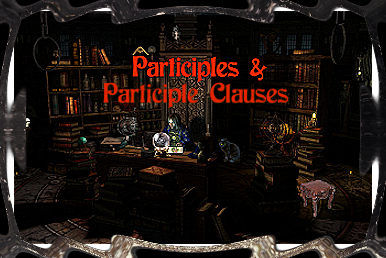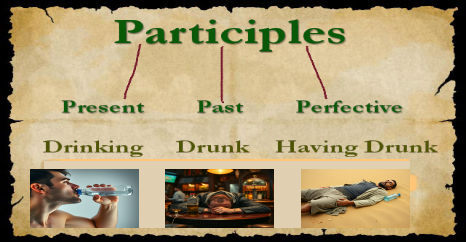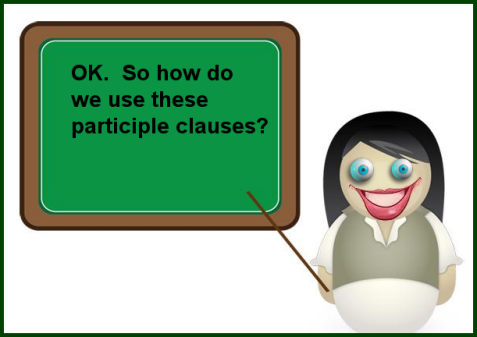
Participles
What is a participle?

A participle is a verbal (sometimes designated by the
symbol V3) as are verbs, gerunds and infinitives.
There are essentially three types of participles:
present, past and perfective.
Examples
Present: Drinking a glass of champaign, Nina
began telling Russian jokes.
Past: Drunk out of his mind, Mr. Bulgakov kissed Anna shamelessly.
Perfective: Having drunk all of her Margarita,
Océane next drank up all of Abel's beer.
Participle Clauses




 Sometimes, Participle Clauses are called Adjective Clauses. Why?
Remember that participles can function as adjectives. Consider the
examples below.
Sometimes, Participle Clauses are called Adjective Clauses. Why?
Remember that participles can function as adjectives. Consider the
examples below.
- The dancing queen is smiling at me.
- That would just be wasted time.
Consider the following sentence.
Knowing that the fastest way to a man's heart is through his stomach, Karen made him a banana cream pie for dessert.
In the sentence above, the participle clause modifies the noun Karen.
Using Present Participles
• To give the result of an action
The skunk joined the class, destroying the air in the room.
• To give the reason for an action
Knowing she loved flowers, Nikita bought her a dozen roses.
• To talk about an action that happened at the same time as another action
Eating a chocolate chip cookie, I noticed a blond hair in it.
• To add information about the subject of the main clause
Starting next year, we are not allowed to park next to Fatburger.
 CHECK UP
CHECK UP
Think about how each participle clause below is used and then click on the clause itself to get the answer.
1. Dancing with her boyfriend, Katerina stole a look at another man.
____________________________
2. She came in through the bathroom window, surprising the rock star as he sang in the shower.
____________________________
3. Including a letter of recommendation, facilitates the admission process.
____________________________
4. Sensing that she was about to cry, he hugged her gently.
____________________________
5. Hearing her boyfriend's voice at the front door, Polina pushed her lover into the bedroom closet.
____________________________
Using Past Participles
• Has a similar meaning to an if conditional
Used in this way, participles can make your writing more concise.
(If you use participles in this way, … )
• To give the reason for an action
Worried about the time, Rawand called Uber.
• To add information about the subject of the main clause
Filled with pride, Nina walked towards the judge to receive her gold medal.
Note that past participles normally have a passive meaning.
Using Perfective Participles
Perfect participle clauses show that the action they describe was finished before the action in the main clause. Perfect participles can be structured to make an active or passive meaning.
Examples:
Having gotten knocked out, the boxer slowly recovered in the dressing room.
Having finished her training, Elena will become a certified ESL teacher.
Having been made expendable, she considered a career change.
Summary
Consider each of the following participle clauses. For what purpose are they used?
- Having smoked her last cigarette, Gohar began to cry.
- Having been eaten by a hungry shark, Sergey was never seen on the beach again.
- Eating Nina's chocolate chip coookies, Len found her blond hair was one of the ingredients.
- Found alive after an all-day search, Sergey claimed that he had thought the shark was a mermaid.
- Watching Sofia carefully, Katerina and Anna were kissing two of her boyfriends passionately.
 CHECK UP
CHECK UP Choose the correct option to complete the sentences.

